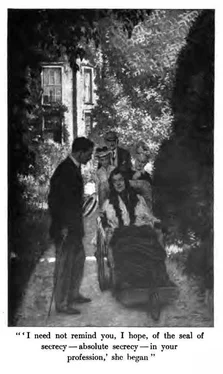"That is how the new water–tap runs out in the kennel," said Farag. "The Excellency Our Governor entertains him that he may make sport. Make him say the mirth–moving speech."
"What did he say about my land–titles?" Farag's uncle was not to be turned.
"He says," Farag interpreted, "that he desires, nothing better than that you should live on your lands in peace. He talks as though he believed himself to be Governor."
"Well. We here are all witnesses to what he has said. Now go forward with the sport." Farag's uncle smoothed his garments. "How diversely hath Allah made His creatures! On one He bestows strength to slay Emirs; another He causes to go mad and wander in the sun, like the afflicted sons of Melik–meid."
"Yes, and to emit spray from the mouth, as the Inspector told us. All will happen as the Inspector foretold," said Farag. "I have never yet seen the Inspector thrown out during any run."
"I think," Abdul plucked at Mr. Groombride's sleeves, "I think perhaps it is better now, Sar, if you give your fine little native speech. They not understanding English, but much pleased at your condescensions."
"Condescensions?" Mr. Groombride spun round. "If they only knew how I felt towards them in my heart! If I could express a tithe of my feelings! I must stay here and learn the language. Hold up the umbrella, Abdull I think my little speech will show them I know something of their vie intime."
It was a short, simple; carefully learned address, and the accent, supervised by Abdul on the steamer, allowed the hearers to guess its meaning, which was a request to see one of the Mudir's Cranes; since the desire of the speaker's life, the object to which he would consecrate his days, was to improve the condition of the Mudir's Cranes. But first he must behold them with his own eyes. Would, then, his brethren, whom he loved, show him a Mudir's Crane whom he desired to love?
Once, twice, and again in his peroration he repeated his demand, using always—that they might see he was acquainted with their local argot—using always, I say, the word which the Inspector had given him in England long ago—the short, adhesive word which, by itself, surprises even unblushing Ethiopia.
There are limits to the sublime politeness of an ancient people. A bulky, blue–chinned man in white clothes, his name red–lettered across his lower shirtfront, spluttering from under a green–lined umbrella almost tearful appeals to be introduced to the Unintroducible; naming loudly the Unnameable; dancing, as it seemed, in perverse joy at mere mention of the Unmentionable—found those limits. There was a moment's hush, and then such mirth as Gihon through his centuries had never heard—a roar like to the roar of his own cataracts in flood. Children cast themselves on the ground, and rolled back and forth cheering and whooping; strong men, their faces hidden in their clothes, swayed in silence, till the agony became insupportable, and they threw up their heads and bayed at the sun; women, mothers and virgins, shrilled shriek upon mounting shriek, and slapped their thighs as it might have been the roll of musketry. When they tried to draw breath, some half–strangled voice would quack out the word, and the riot began afresh. Last to fall was the city–trained Abdul. He held on to the edge of apoplexy, then collapsed, throwing the umbrella from him.
Mr. Groombride should not be judged too harshly. Exercise and strong emotion under a hot sun, the shock of public ingratitude, for the moment rued his spirit. He furled the umbrella, and with t beat the prostrate Abdul, crying that he had been betrayed. In which posture the Inspector, on horseback, followed by the Governor, suddenly found him.
* * * * *
"That's all very well," said the Inspector, when he had taken Abdul's dramatically dying depositions on the steamer, "but you can't hammer a native merely because he laughs at you. I see nothing for it but the law to take its course."
"You might reduce the charge to—er—tampering with an interpreter," said the Governor. Mr. Groombride was too far gone to be comforted.
"It's the publicity that I fear," he wailed. "Is there no possible means of hushing up the affair? You don't know what a question—a single question in the House means to a man of my position—the ruin of my political career, I assure you."
"I shouldn't have imagined it," said the Governor thoughtfully.
"And, though perhaps I ought not to say it, I am not without honour in my own country—or influence. A word in season, as you know, Your Excellency. It might carry an official far."
The Governor shuddered.
"Yes, that had to come too," he said to himself. "Well, look here. If I tell this man of yours to withdraw the charge against you, you can go to Gehenna for aught I care. The only condition I make is that if you write—I suppose that's part of your business about your travels, you don't praise me!"
So far Mr. Groombride has loyally adhered to this understanding.
All day long to the judgment–seat
The crazed Provincials drew—
All day long at their ruler's feet
Howled for the blood of the Jew.
Insurrection with one accord
Banded itself and woke:
And Paul was about to open his mouth
When Achaia's Deputy spoke
"Whether the God descend from above
Or the man ascend upon high,
Whether this maker of tents be Jove
Or a younger deity—
I will be no judge between your gods
And your godless bickerings,
Lictor, drive them hence with rods—
I care for none of these things!
"Were it a question of lawful due
Or a labourer's hire denied,
Reason would I should bear with you
And order it well to be tried
But this is a question of words and names
And I know the strife it brings,
I will not pass upon any your claims.
I care for none of these things.
"One thing only I see most clear,
As I pray you also see.
Claudius Caesar hath set me here
Rome's Deputy to be.
It is Her peace that ye go to break
Not mine, nor any king's,
But, touching your clamour of 'conscience sake,'
I care for none of these things!"
On an evening after Easter Day, I sat at a table in a homeward bound steamer's smoking–room, where half a dozen of us told ghost stories. As our party broke up a man, playing Patience in the next alcove, said to me: "I didn't quite catch the end of that last story about the Curse on the family's first–born."
"It turned out to be drains," I explained. "As soon as new ones were put into the house the Curse was lifted, I believe. I never knew the people myself."
"Ah! I've had my drains up twice; I'm on gravel too."
"You don't mean to say you've a ghost in your house? Why didn't you join our party?"
"Any more orders, gentlemen, before the bar closes?" the steward interrupted.
"Sit down again, and have one with me," said the Patience player. "No, it isn't a ghost. Our trouble is more depression than anything else."
"How interesting? Then it's nothing any one can see?"
"It's—it's nothing worse than a little depression. And the odd part is that there hasn't been a death in the house since it was built—in 1863. The lawyer said so. That decided me—my good lady, rather and he made me pay an extra thousand for it."
"How curious. Unusual, too!" I said.
"Yes; ain't it? It was built for three sisters—Moultrie was the name—three old maids. They all lived together; the eldest owned it. I bought it from her lawyer a few years ago, and if I've spent a pound on the place first and last, I must have spent five thousand. Electric light, new servants' wing, garden—all that sort of thing. A man and his family ought to be happy after so much expense, ain't it?" He looked at me through the bottom of his glass.
Читать дальше












